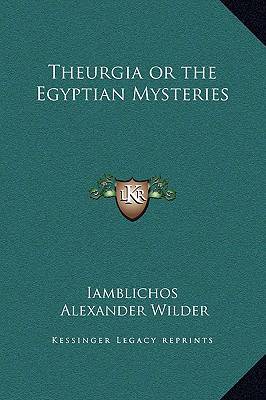
- Retrait gratuit dans votre magasin Club
- 7.000.000 titres dans notre catalogue
- Payer en toute sécurité
- Toujours un magasin près de chez vous
- Retrait gratuit dans votre magasin Club
- 7.000.000 titres dans notre catalogue
- Payer en toute sécurité
- Toujours un magasin près de chez vous
62,45 €
+ 124 points
Description
Theurgia or the Egyptian Mysteries is a book written by Iamblichos, a philosopher and mystic who lived in the 3rd and 4th centuries AD. The book is a treatise on the ancient Egyptian religion and its practices, which Iamblichos believed held the key to spiritual enlightenment and divine communion.In the book, Iamblichos discusses the various rituals and ceremonies of the Egyptian religion, including the worship of the gods and goddesses, the use of talismans and amulets, and the practice of divination. He also explores the concept of theurgy, which he defines as the art of divine communication through ritual and prayer.Throughout the book, Iamblichos draws on the teachings of ancient philosophers such as Plato and Pythagoras, as well as the writings of earlier Egyptian mystics and priests. He argues that the true purpose of the Egyptian religion is not simply to gain material wealth or power, but to attain spiritual enlightenment and union with the divine.The book is considered a classic of ancient mysticism and has been highly influential in the development of Western esotericism. It remains a valuable resource for scholars and practitioners of mysticism, as well as anyone interested in the history and philosophy of ancient Egypt.1911. Reply of Abammon, the Teacher to The Letter of Porphyry to Anebo together with Solutions of the Questions Therein Contained.This scarce antiquarian book is a facsimile reprint of the old original and may contain some imperfections such as library marks and notations. Because we believe this work is culturally important, we have made it available as part of our commitment for protecting, preserving, and promoting the world's literature in affordable, high quality, modern editions, that are true to their original work.
Spécifications
Parties prenantes
- Auteur(s) :
- Editeur:
Contenu
- Nombre de pages :
- 284
- Langue:
- Anglais
Caractéristiques
- EAN:
- 9781169311671
- Date de parution :
- 10-09-10
- Format:
- Livre relié
- Format numérique:
- Genaaid
- Dimensions :
- 178 mm x 254 mm
- Poids :
- 707 g







